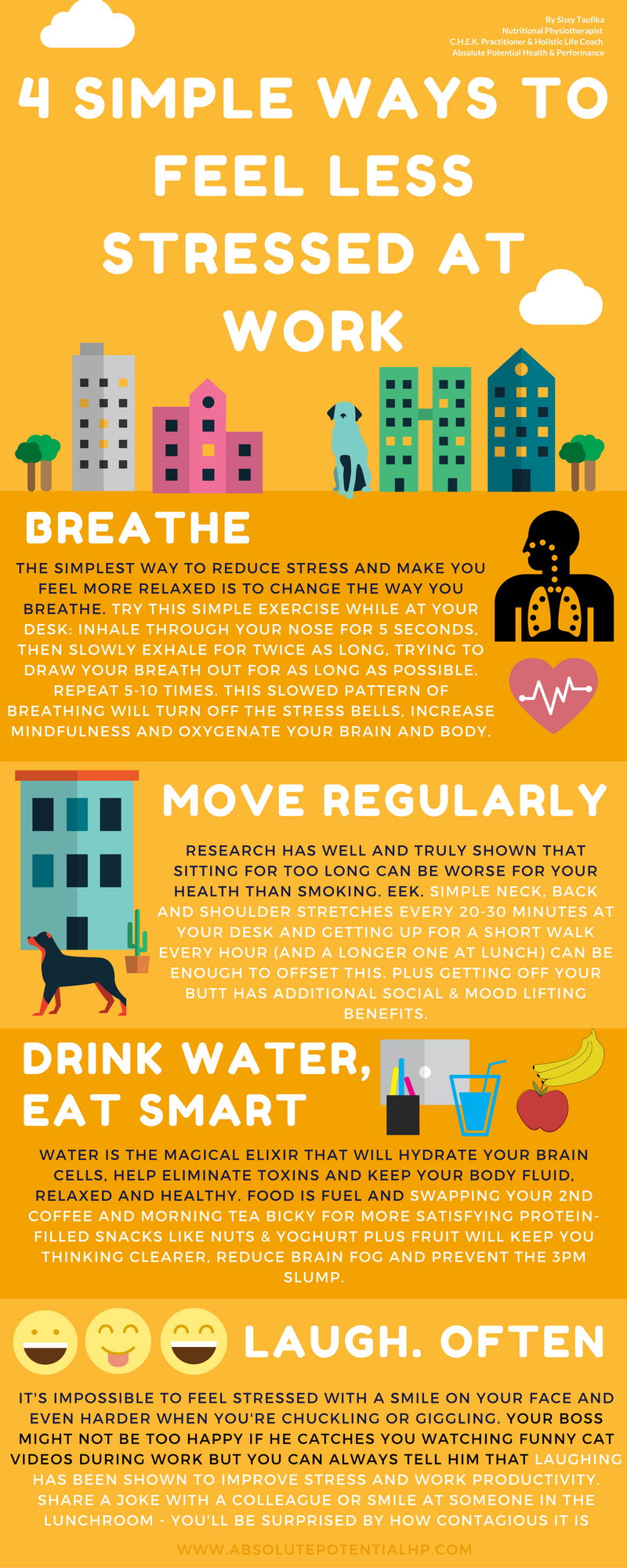4 Simple Ways to Feel Less Stressed At Work
/We're all looking for ways to feel less stressed at work - here are four simple, physio-approved ways to get your zen on without looking like you're slacking off!
1. Breath.
Breathing one of the few processes that is controlled both voluntarily and involuntarily, and is a highly efficient way to feel less stressed immediately. Breathing in excites and stimulates our sympathetic nervous system, increasing our heart rate and getting us ready to 'fight or fly' which is why many athletes will hype themselves up before a big game by taking lots of short breaths in. Conversely, breathing out - even more so if done slowly - down regulates and de-stresses by tapping into our parasympathetic nervous system, aka our 'rest and digest' mode. This is why yoga and meditation teachers encourage you to focus on your exhalation, drawing it out as long as you can. Interesting point to ponder: have you ever wondered why smokers say that having a cigarette calms them down? Of course there's the chemical and nicotine factor, but if you think about it, by taking a long, extended 'puff' out they're actually practicing this very method of slowing down their breath and subsequently relaxing their bodies.
2. Move Regularly
I'm a physio, so of course there was going to be a movement related tip :) Movement, specifically regular aerobic exercise (the type that gets your heart rate up and involves you moving most - if not all - of your body, like running, walking, skipping or cycling) calms your body and resets your neurons' stress threshold. In effect, it takes more for you to get stressed than if you didn't regularly work out. How does it do this? Paradoxically, movement and exercise are mild stressors that our bodies have to respond to and they do this by growing new nerve cells, activating genes that produce proteins which protect cells against damage and disease and basically fortifying our reserves against future stressors (1). Moving also equals increased blood flow and circulation which can unlock those muscles you've kept tense all day - a simple overhead shoulder stretch or getting up to talk to your colleague rather than sending an email can be enough. Keep in mind that if the exercise is overly stress-FULL, it is unlikely to be beneficial; a 10 minute walk around the block at lunchtime is optimal for stress-relieving benefits as well as providing fresh air, a chance to clear your head and will leave you feeling more refreshed and focused to tackle the rest of the day. Do it with your favourite desk buddy and you'll get added benefits of social interaction and perhaps even a good laugh (see point 4!)
3. Drink Water, Eat Smart
I can't stress (lol) enough how important drinking enough water and eating good food is to maintaining your mood and reducing stress levels. While it can feel like a mid-morning 3rd coffee and chocolate take the edge off and give you more energy, you'll soon experience a blood sugar drop that makes your feel even more frazzled. There are more than 10 billion biochemical reactions that occur in your body that rely on water and our ability to manage stress is made easier with a good supply of essential nutrients and minerals to fuel the hormonal and physiological processes that occur during these times. Cortisol, our major stress hormone, tends to sap our levels of progesterone, which is the building block of other hormones such as testosterone and estrogen. This is usually why we lose our interest in sex, motivation and desire when we're stressed out (not to mention the effects long-term stress have on fertility and reproduction). Making sure we are drinking plenty of good quality water and increasing consumption of clean protein (organic grass-fed beef and chicken, free-range eggs, legumes) and good fats (such as salmon, raw almonds, avocado) during stressful times can help us cope better.
4. Laugh. Often. (this one should be mandatory)
This one has both clear cut clinical and scientifically based evidence behind it. Laughter has been shown to:
Wake up your organs, increase oxygen: Laughter causes you to take in more air (see point number 1) and stimulates your heart, lungs and muscles. A good hearty laugh also increases the endorphins that are released by your brain (2).
Activate and relieve your stress response. Guffawing, giggling and chuckling fire up your stress response, increase your heart rate and blood pressure then cool it right back down. This results in an all-over warm and fuzzy relaxed post-laugh feeling (3)
Release tension: Laughing stimulates circulation and helps muscle relaxation which can help to reduce the physical symptoms of stress (like that tight, sore upper back and neck) (4)
Improve your immune system: Laughing tends to put us in a more positive frame of mind with more positive thoughts (it's hard to think negative when you're giggling over Brooklyn 99) which stimulate release of neuropeptides that help you fight off stress and other serious illnesses. Negative thoughts on the other hand can trigger reactions in your body that stress your system and decrease your immunity (5).
Increase resilience: It's a given that difficult situations will happen but laughter helps us cope better when they do come along (6).
Improve mood: Having a good laugh regularly can help reduce depression and anxiety and may make you feel happier (7).
References
Ratey, J.J. (2008). Spark, 1st Ed. Little Brown and Company: New York, USA
Fight stress with healthy habits. American Heart Association. http://www.heart.org/HEARTORG/HealthyLiving/StressManagement/FightStressWithHealthyHabits/Fight-Stress-with-Healthy-Habits_UCM_307992_Article.jsp#.VtB5i9j2bIU.
Woodbury-Farina, M.A., et al. (2014). Humor. Psychiatric Clinics of North America. 37:561.
Wilkins, J., et al. (2009) Humor theories and the physiological benefits of laughter. Holistic Nursing Practice. 23:349.
Lebowitz, K.R., et al. (2011). Effects of humor and laughter on psychological functioning, quality of life, health status, and pulmonary functioning among patients with chronic obstructive pulmonary disease: A preliminary investigation. Heart & Lung. 40:310.
Chang, C., et al. (2013). Psychological, immunological and physiological effects of a Laughing Qigong Program (LQP) on adolescents. Complementary Therapies in Medicine. 21:660.
Seaward, B.L. (2014) Comic relief: The healing power of humor. In: Essentials of Managing Stress. 3rd ed. Sudbury, Mass.: Jones & Bartlett Publishers.


